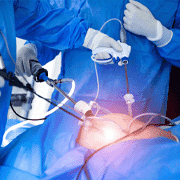Treatment After Laparoscopy for Pregnancy - What You Need to Know
In This Article
Treatment After Laparoscopy for Pregnancy - What You Need to Know
Sreemoyee
Updated on October 21, 2024
Medically verified by Dr. Arya
Fact checked by Dr. Sharon

Laparoscopic
8 min read
Bringing a new life into the world is a journey filled with excitement and mystery. Sometimes you may need a little extra help. Laparoscopy is a minimally invasive procedure that helps in identifying and fixing certain pregnancy-related issues. We’ve already discussed that in our previous blog. But that may not be enough.
At times, you may require further specific treatments. These may increase your chances of conception. Wondering what they are? Mykare Health is here to give you the ultimate guide on these treatments after laparoscopy.
Before we delve into the treatments after laparoscopy, here’s a glimpse of laparoscopy treatment for pregnancy.
What is Laparoscopy?
Laparoscopy is also known as minimally invasive surgery or keyhole surgery. It is a groundbreaking medical technique for pregnancy related issues. It allows doctors to perform complex procedures with minimal incisions.
Here are certain must-knows about laparoscopic surgery.
What happens before laparoscopy
- Your doctor will do your evaluation first and review your medical history. Mykare Health will connect you with the expert surgeons for this step.
- The doctor will conduct necessary pre-operative tests and imaging like ultrasound, CT scan, MRI.
- He/she will get your consent for laparoscopy.
What happens during laparoscopy
-
Surgeons will give general anaesthesia to ensure that you are unconscious. And don’t feel any pain.
-
They will place you in the appropriate position on the operating table. You will have to lie flat with arms at the side, raised.
-
The surgeon will make a small incision (about 1 cm) near your navel.
-
He will then insert a trocar (a tube-like device) into the incision. And pump carbon dioxide gas into the abdominal cavity. This creates a working space by lifting the abdominal wall away from the organs.
-
The surgeon will insert the laparoscope. It is a thin, flexible tube with a light and camera at the tip through the trocar. It will help surgeons to see the internal organs on a monitor.
-
He/she will make about 2 to 4 more small incisions in strategic locations. This will help to accommodate specialised surgical instruments.
-
The surgeon will use the laparoscopic instruments to perform surgical tasks. Like, cutting, suturing, stapling, or removing tissues or organs.
-
The surgeon uses a monitor where the surgical field is magnified. This improves precision and accuracy during the procedure.
-
Techniques like cauterisation and others control bleeding.
What happens after laparoscopy
-
The surgeon will remove the instruments and laparoscope from your body. He/she will close the trocar incisions with sutures, surgical glue, or adhesive strips.
-
The surgeon will check on you as you recover from anaesthesia.
-
He/she will give you instructions and tips on caring. That will reduce the risk of complications. And lead to quicker recovery.
What are the Treatments After Laparoscopy for Pregnancy?
After undergoing laparoscopy, various treatments can be prescribed to address specific conditions. These conditions are the main challenges for your ability to conceive and need to be rid of. These treatments are tailored to your individual needs and reproductive health concerns. Each treatment targets different conditions and aims to optimise your chances of successful conception.
How much do these treatments cost in India
Understanding the financial aspect is crucial when considering fertility treatments. Costs can vary based on factors like location, clinic reputation, and treatment type.
Please note: These costs are approximate and can vary significantly.
What Conditions Do They Treat?
The treatments after laparoscopy for pregnancy are aimed at addressing certain conditions. Like -
Endometriosis: It is a condition where tissue similar to the lining of the uterus grows outside the uterus. It can cause you pain and fertility issues.
Polycystic Ovary Syndrome (PCOS): It is a hormonal disorder affecting your ovulation and fertility.
Fallopian Tube Blockages: Obstructions in the fallopian tubes can hinder the passage of eggs and sperm.
Uterine Fibroids: These are noncancerous growths in the uterus. These can affect your fertility.
Ovarian Cysts: These are fluid-filled sacs on the ovaries that can impact conception.
How Do the Procedures Take Place
These treatments often include:
Ovulation Induction: Stimulating ovaries to release eggs, increasing chances of fertilisation.
Intrauterine Insemination (IUI): Placing sperm directly into the uterus for higher chances of fertilisation.
In Vitro Fertilisation (IVF): Fertilising eggs with sperm outside the body. And then implanting embryos into the uterus.
Choosing the Right Treatment
-
Consult with a fertility specialist to determine the most suitable treatment. Based on your medical history and condition. Mykare Health is here to arrange this consultation for you.
-
Consider the benefits and risks carefully before making a decision.
-
Be aware of the costs. Choose a treatment that aligns with your budget and fertility goals. Mykare Health can give you financial support. By helping you through the insurance process. You can also opt for its no cost EMI options.
Benefits of the Treatments After Laparoscopy:
| Treatment | Benefits |
|---|---|
| Ovulation Induction | Increases egg production |
| Intrauterine Insemination | Direct delivery of sperm |
| In Vitro Fertilisation | Higher success rates |
Risks Involved in the Treatments After Laparoscopy :
| Treatment | Benefits |
|---|---|
| Ovulation Induction | Risk of multiple pregnancies |
| Intrauterine Insemination | Risk of infection |
| In Vitro Fertilisation | Emotional stress |
 9 min read
9 min readTop 9 Things To Know About Laparoscopic Treatment for Pregnancy
 9 min read
9 min readHow Much Does Laparoscopy Treatment Cost? Here's The Truth
 8 min read
8 min readThings To Be Mindful Of Recovery After Laparoscopic IUI Treatment
Get a Callback Now
Safety Precautions Taken by Doctors.
Your well-being is the first priority of Mykare Health’s doctors. They make sure to follow a safety protocol as you go through treatment after laparoscopy with us. Want to know what these are. Here you go.
Thorough Medical Evaluation:
Before recommending any post-laparoscopy treatments, our doctors conduct a comprehensive medical evaluation. This includes reviewing your medical history, previous fertility treatments, and laparoscopy procedure details. This helps the doctor tailor the treatment plan to your specific needs and fertility concerns.
Customised Treatment Plans: Our doctors understand that every individual's fertility situation is unique. They design personalised treatment plans based on the evaluation results. This ensures that the recommended treatments are targeted and aligned with your reproductive health goals.
Monitoring and Testing: Throughout the treatment process, doctors closely monitor your progress. This involves regular check-ups, ultrasounds, and hormone level assessments. To track the response to the treatments. Monitoring helps doctors make timely adjustments to your treatment plan if needed.
Medication Management: If medications are prescribed as part of the treatment, our doctors carefully monitor the dosage and its effects. They ensure that you're taking the right medications at the appropriate times. To optimise the chances of success while minimising any potential risks.
Informed Consent: Before proceeding with any treatment, our doctors provide you with detailed information. About the procedure, potential benefits, risks, and side effects. This process allows you to make an informed decision. About whether to proceed with the treatment based on your understanding and comfort level.
Multidisciplinary Approach: In complex cases, doctors may involve a team of specialists, including fertility experts, endocrinologists, and counsellors. This multidisciplinary approach considers all aspects of your health and well-being.
Safe and Sterile Environment: During treatments that involve procedures such as intrauterine insemination (IUI) or in vitro fertilisation (IVF), doctors ensure that the environment is safe and sterile. To prevent infections or complications.
Clear Communication: Our doctors maintain clear and open communication with patients throughout the treatment process. They give you guidance on how to administer medications, when to come for appointments, and what to expect at each stage.
Adherence to Guidelines: Medical professionals adhere to established guidelines and best practices for fertility treatments. These guidelines are designed to ensure the highest level of safety and success for both the mother and the baby.
Patient Support: Doctors understand the emotional and psychological aspects of fertility treatments. They offer emotional support and counselling. To help patients cope with the stress and anxiety that can sometimes accompany the journey
Tips From Doctors on Quick Recovery
Rest and Relaxation: Allow your body to recover after treatments.
Follow Medical Advice: Adhere to prescribed medications and post-treatment instructions.
Healthy Lifestyle: Eat well, exercise moderately, and manage stress.
Stay Informed: Understand the process and ask questions to your healthcare team.
Embarking on this journey may seem overwhelming. But advancements in medical technology coupled with professional care can offer hope and solutions. The road to pregnancy might have its ups and downs. But with the right treatments and support, you can experience those tiny footsteps in no time.
Laparoscopy is a minimally invasive procedure used to address pregnancy-related issues.
Laparoscopy allows doctors to perform complex procedures with minimal incisions.
Before laparoscopy, a medical evaluation and necessary tests are conducted.
During laparoscopy, a thin tube with a camera is inserted to visualise internal organs.
Laparoscopic instruments are used for surgical tasks, with a focus on precision.
After laparoscopy, incisions are closed, and post-operative care is given.
After laparoscopy, further treatments may be needed to enhance conception.
Treatments include ovulation induction, intrauterine insemination (IUI), and in vitro fertilisation (IVF).
These treatments target your specific conditions such as irregular ovulation and male factor infertility.
Each treatment offers benefits like improved chances of conception but also comes with risks.
Costs for treatments vary based on factors like location and treatment type.
Conditions treated include endometriosis, PCOS, fallopian tube blockages, uterine fibroids, and ovarian cysts.
Treatments involve techniques like stimulating egg production and direct sperm delivery.
Mykare doctors ensure personalised treatment plans, thorough monitoring, and medication management.
Doctors obtain your Informed consent. They consider multidisciplinary approaches for complex cases.
Doctors ensure a sterile environment during treatments to prevent infections.
You will get clear communication, adherence to guidelines, and emotional support.
Tips for quick recovery include rest, following medical advice, a healthy lifestyle, and staying informed.
Remember, each step in this journey is tailored to your individual needs and aims to bring you closer to the beautiful experience of parenthood.



